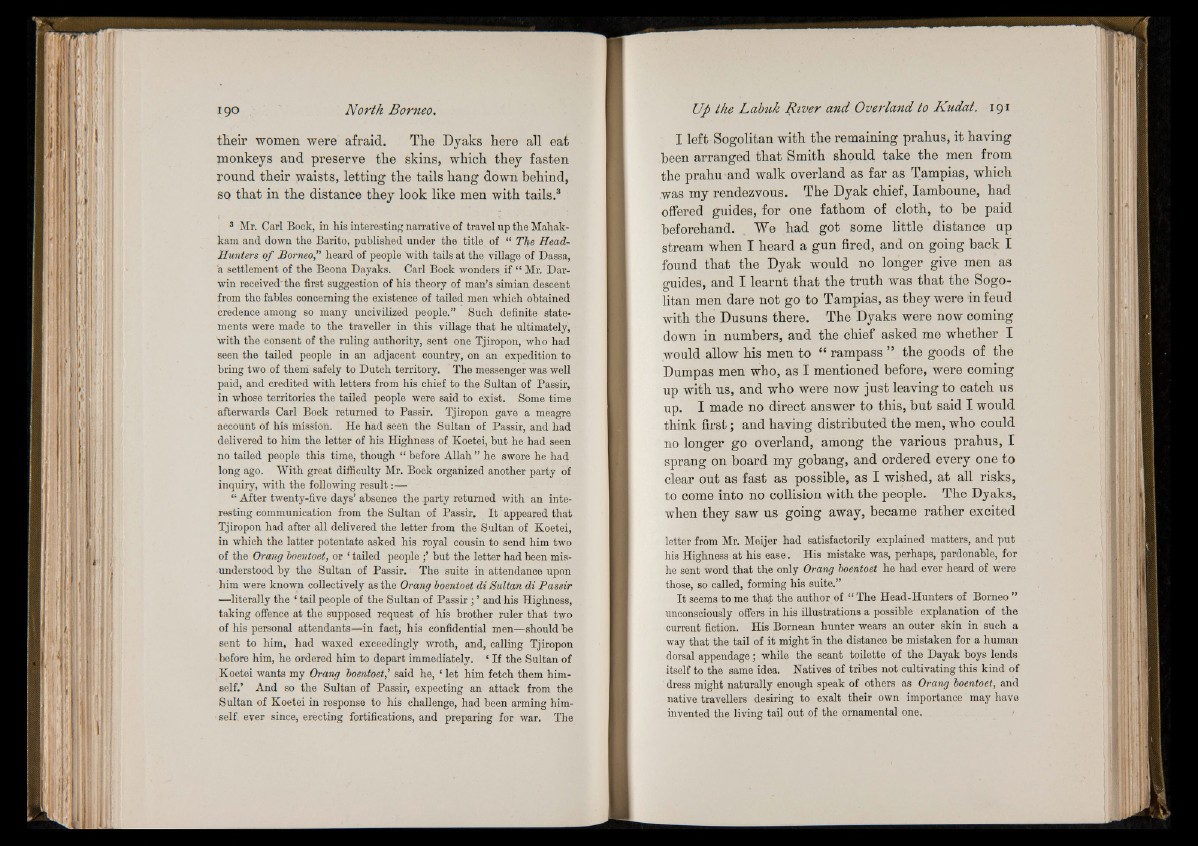
their women were afraid. The Dyaks here all eat
monkeys and preserve the skins, which they fasten
round their waists, letting the tails hang down behind,
so that in the distance they look like men with tails.3
3 Mr. Carl Bock, in his interesting narrative of travel up the Mahak-
kam and down the Barito, published under the title of “ The Head-
Hunters o f Borneo,” heard of people with tails at the village of Dassa,
‘a settlement of the Beona Dayaks. Carl Bock wonders if “ Mr. Darwin
received'the first suggestion of his theory of man’s simian descent
from the fables concerning the existence of tailed men which obtained
credence among so many uncivilized people.” Such definite statements
were made to the traveller in this village that he ultimately,
with the consent of the ruling authority, sent one Tjiropon, who had
seen the tailed people in an adjacent country, on an expedition to
bring two of them safely to Dutch territory. The messenger was well
paid, and credited with letters from his chief to the Sultan of Passir,
in whose territories the tailed people were said to exist. Some time
afterwards Carl Bock returned to Passir. Tjiropon gave a meagre
account of his mission. He had seen the Sultan of Passir, and had
delivered to him the letter of his Highness of Eoetei, but he had seen
no tailed people this time, though “ before Allah ” he swore he had
long ago. With great difficulty Mr. Bock organized another party of
inquiry, with the following result:—
“ After twenty-five days’ absence the party returned with an interesting
communication from the Sultan of Passir. I t appeared that
Tjiropon had after all delivered the letter from the Sultan of Eoetei,
in which the latter potentate asked his royal cousin to send him two
of the Orang boentoet, or ‘ tailed people ;’ but the letter had been misunderstood
by the Sultan of Passir. The suite in attendance upon
him were known collectively as the Orang boentoet di Sultan di Passir
—literally the ‘ tail people of the Sultan of Passir; ’ and his Highness,
taking offence at the supposed request of his brother ruler that two
of his personal attendants—in fact, his confidential men—should be
sent to him, had waxed exceedingly wroth, and, calling Tjiropon
before him, he ordered him to depart immediately. ‘ If the Sultan of
Eoetei wants my Orang boentoet,' said he, ‘ let him fetch them himself.’
And so the Sultan of Passir, expecting an attack from the
Sultan of Eoetei in response to his challenge, had been arming himself
ever since, erecting fortifications, and preparing for war. The
I left Sogolitan with the remaining prahus, it having
been arranged that Smith should take the men from
the prahu and walk overland as far as Tampias, which
was my rendezvous. The Dyak chief, Iamboune, had
offered guides, for one fathom of cloth, to be paid
beforehand. "We had got some little distance up
stream when I heard a gun fired, and on going back I
found that the Dyak would no longer give men as
guides, and I learnt that the truth was that the Sogolitan
men dare not go to Tampias, as they were in feud
with the Dusuns there. The Dyaks were now coming
down in numbers, and the chief asked me whether I
would allow his men to “ rampass ” the goods of the
Dumpas men who, as I mentioned before, were coming
up with us, and who were now just leaving to catch us
up. I made no direct answer to this, but said I would
think first; and having distributed the men, who could
no longer go overland, among the various prahus, I
sprang on board my gobang, and ordered every one to
clear out as fast as possible, as I wished, at all risks,
to come into no collision with the people. The Dyaks,
when they saw us going away, became rather excited
letter from Mr. Meijer had satisfactorily explained matters, and put
his Highness at his ease. His mistake was, perhaps, pardonable, for
he sent word that the only Orang boentoet he had ever heard of were
those, so called, forming his suite.”
It seems to me thajb the author of “ The Head-Hunters of Borneo ”
unconsciously offers in his illustrations a possible explanation of the
current fiction. His Bornean hunter wears an outer skin in such a
way that the tail of it might ’in the distance be mistaken for a human
dorsal appendage; while the scant toilette of the Dayak boys lends
itself to the same idea. Natives of tribes not cultivating this kind of
dress might naturally enough speak of others as Orang boentoet, and
native travellers desiring to exalt their own importance may have
invented the living tail out of the ornamental one.